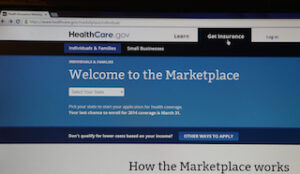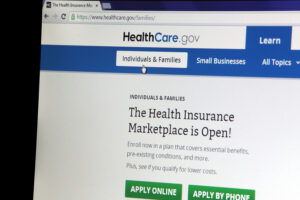Some consumers covered by Affordable Care Act insurance plans are being switched from one plan to another without their express permission, according to a KFF Health News article by Julie Appleby published this week.
This leaves many potentially unable to see their doctors or fill prescriptions. Some face large IRS bills for back taxes.
Unauthorized enrollment or “plan switching” is emerging as a serious challenge for the ACA, also known as Obamacare, according to the article. Brokers say the ease with which rogue agents can get into policyholder accounts in the 32 states served by the federal marketplace plays a major role in the problem, found an investigation by KFF Health News.
Armed with only a person’s name, date of birth, and state, a licensed agent can access a policyholder’s coverage through the federal exchange or its direct enrollment platforms. It’s harder to do through state ACA markets, because they often require additional information.
“It’s rampant. It’s horrible,” Ronnell Nolan, president of Health Agents for America, a nonprofit trade association representing independent insurance brokers, told KFF Health News.
The growing outcry from agents who have had their clients switched by rivals—which can steer monthly commissions to the new agent—casts a shadow on what otherwise has been a record year for ACA enrollment. More than 21 million people signed up for 2024 coverage.
Federal regulators are aware of the increase in unauthorized switching and say they have taken steps to combat it. It’s unclear, though, if these efforts will be enough.
On Feb. 26, the Centers for Medicare & Medicaid Services sent a “plan switch update” to industry representatives acknowledging “a large number” of 2024 cases and outlining some of its technical efforts to resolve problems when complaints are lodged.
“CMS is committed to protecting consumers in the marketplace,” said Jeff Wu, deputy director for policy for CMS’ Center for Consumer Information & Insurance Oversight, in a written statement to KFF Health News.
His office refused to provide details to KFF Health News on how many complaints it has seen or the number of agents it has sanctioned but his statement said when action is taken, CMS reports it to state insurance departments, whose authority includes revoking licenses.
In June, new rules kicked in that require brokers to get policyholders’ written or recorded verbal consent before making changes, although brokers said they are rarely asked for those documents.
Some unwitting enrollees not only end up in plans they didn’t choose but also bear a tax burden. That happens when enrollees are signed up for coverage that includes premium tax credits paid by the government to insurers, even though the enrollee is ineligible, either because their income was misstated by the broker making the switch, or they had job-based insurance.
Some switches could be legitimate, when enrollees choose a different broker or plan. And agents do have a vested interest in raising the issue. They lose out on commissions when their clients are switched by other agents. But brokers whose clients have been switched through unauthorized transactions say the real losers are consumers.
Patients’ new plans might not include their doctors or might come with higher deductibles than their former coverage. Because the agent on the policy is generally switched, too, enrollees don’t know whom to call for help.
Ease of access to policyholders’ accounts on the federal marketplace is a double-edged sword, agents say: It aids enrollment, but also makes it easier to switch plans without consent.
“Those bad eggs now have access to all this private information about an individual,” including household income, Social Security numbers, and dependents, said Joshua Brooker, a broker who follows the issue closely as chair of a marketplace committee for the National Association of Benefits and Insurance Professionals, a trade group.
Complaints gained momentum during the most recent open enrollment period, agents say. One worker in a government office that helps oversee operations of the federal exchange told KFF Health News of personally handling more than 1,200 complaints about unauthorized switches or enrollments in the past three months, averaging about 20 a day. About 30 co-workers are working on similar complaints. It can take multiple days to resolve the most urgent cases, and two to four weeks for those deemed less urgent, the worker said.
3 states are plan-switching hotbeds
Florida, Georgia, and Texas appear to be plan-switching hotbeds, agents say. Florida and Texas officials referred questions to federal regulators. Bryce Rawson, press secretary for the Georgia Department of Insurance, says the state saw no switching complaints last year and has about 30 so far in 2024, a small number but one it is taking seriously: “It’s still an active and ongoing investigation.”
By contrast, states that run their own marketplaces—there are 18 and the District of Columbia that do—have been more successful in thwarting such efforts because they require more information before a policy can be accessed, Brooker said.
In Colorado, for example, customers create accounts on the state’s online market and can choose which brokers have access. Pennsylvania has a similar setup. California sends a one-time password to the consumer, who then gives it to the agent before any changes can be made.
Adding such safeguards to healthcare.gov could slow the enrollment process. Federal regulators are “trying to thread a needle between making sure people can get access to coverage and also providing enough of a barrier to capture anyone who is coming in and acting nefariously,” Brooker said.
Online or social media advertising is a way some outfits troll for prospects, who then end up on lists sold to brokers or are contacted directly by agents. Such lists are not illegal. The problem is the ads are often vague, and consumers responding may not realize the ads are about health insurance or might result in their policies being changed.
• Click here to read the complete original article on KFF Health News.
SEE ALSO:
• ACA Marketplace Enrollment Tops 21 Million, Nearly 5 Million More than 2023











